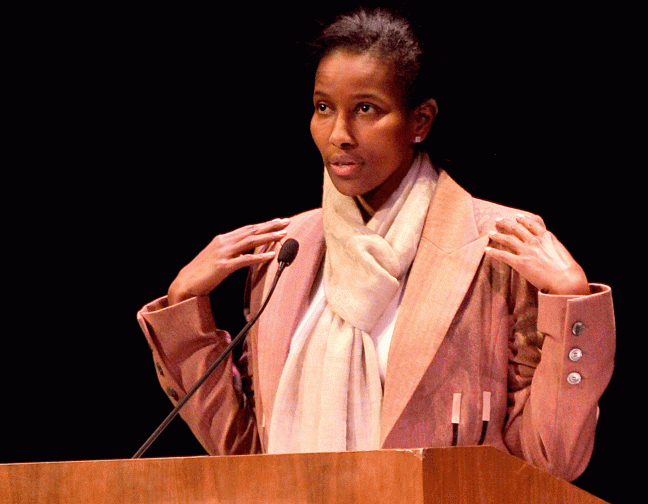Controversial DLS speaker talks about abuse of women by Muslims, death threats made against her due to her academic work in Holland. Memorial Union Theater implemented airport style security to accommodate Hirsi Ali’s speech. Filmed by Charlie Gorichanaz and Conor Furey-King Feb. 2, 2010.
http://http://vimeo.com/9174801
One on one interview
Kyle Mianulli and Charlie Gorichanaz spoke with Ayaan Hirsi Ali prior to her Feb. 2 speech at the Memorial Union Theater. Hirsi Ali talked about living with death threats and how she believes Islamic doctrine is incompatible with human rights.
http://http://vimeo.com/9184055
Full speech: DLS presents Ayaan Hirsi Ali
Controversial DLS speaker talks about abuse of women by Muslims, death threats made against her due to her academic work in Holland
http://http://vimeo.com/9188087
Ayaan Hirsi Ali takes audience questions
Controversial DLS speaker takes audience questions. Filmed by Conor Furey-King and Charlie Gorichanaz.
“Allahu Akbar,” several audience members yelled as Ayaan Hirsi Ali took the stage Tuesday night. “That means God is great,” she responded. “I’m not going to say God is great.”
The highly anticipated and controversial speaker of the University of Wisconsin’s Distinguished Lecture series, Hirsi Ali, is a Muslim woman who fled her home country of Somalia and devoted her life to speaking against Islamic doctrine and what she calls the “sanctioned abuse of women.”
University of Wisconsin Muslim Student Association President Rashid Dar had previously said MSA was not in support of bringing Hirsi Ali to campus because of her openly anti-Islamic agenda.
“If she would have her way, everyone will leave the theater thinking Islam is evil,” Dar said.
About 1,300 UW students, faculty and community members were ushered through metal detectors and past armed police as they entered the Memorial Union Theatre Tuesday night, a process which delayed the event more than an hour.
She began her story by telling how she ran from an Islamic traditional arranged marriage, finding refuge in an academic community in Holland where she published papers openly critical of Islam and the Islamic community, specifically regarding the oppressive and abusive treatment of women.
“Because of my work there, my life was threatened and continues to be threatened,” Hirsi Ali said.
In November 2004, the controversial nature of her messages came to a front when the Dutch filmmaker Theo van Gogh, who was working on a film with Hirsi Ali criticizing the treatment of women in Islam, was murdered in the streets of Holland.
Shot and beheaded, van Gogh was left in the street with an explicit death threat for Hirsi Ali stabbed into his chest.
Integral to her academic and subsequent pursuits is the idea that the basic principals of western democracy are inherently incompatible with Islamic ideology.
She added rather than offset Islam against Christianity, as is most common, it is perhaps more appropriate to offset it with the Western political theories of liberal democracy.
She went on to say violence against women in the Islamic world is systemic and written into the religious texts that are also used as state law in some countries.
It is this ideology Hirsi Ali said that has led to widespread Islamic acceptance and practice of violence against women.
“I’m not talking about Muslims, but Islamic doctrine, that the rules, the laws, the values that are espoused in there are hostile to women, and when they are practiced we see terrible things happen to women,” Hirsi Ali said in an interview with The Badger Herald.
Such things are not unique to the Muslim world Hirsi Ali said. She referenced an incident in Texas where a Muslim father killed two of his daughters because they were in relationships with American boys.
When Hirsi Ali asked the audience who had heard of the tragedy, she counted six raised hands, which she said evidences the pervasive western idea that Islam is beyond the same scrutiny and criticism given to western religious political theories.
“I would like to start in Wisconsin, the idea that it is okay to scrutinize this Islamic theology, … Scrutinize it, question it and treat it like any other religion or political theory. It’s okay to question this and that’s where change begins,” Hirsi Ali said in the interview.
Not all in attendance were complicit to Hirsi Ali’s message, however.
UW constitutional law professor Asifa Quraishi cautioned audience members during a question and answer period not to take Hirsi Ali’s message as the whole story.
Just as American constitutional law cannot be reduced to specific controversial laws, Quraishi said neither can Hirsi Ali’s message.
“I advise all of us to take a pause and think that maybe there is a little bit more to this story than we have heard tonight,” Quraishi said.
Lt. Jason Whitney of UW Police Department said while there were security concerns, there were no serious problems.







